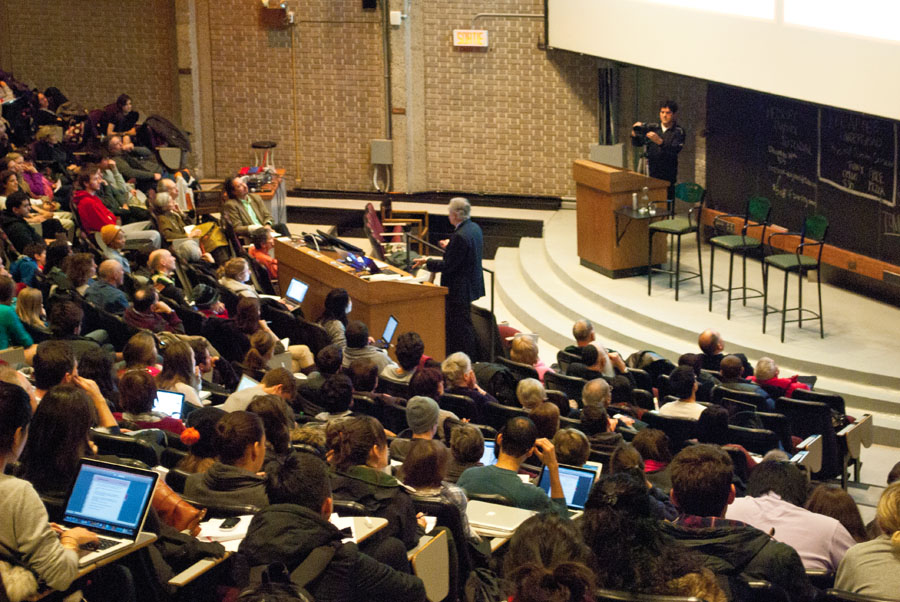On Nov. 27, in a crowded Leacock 132 auditorium, McGill’s Office of Science and Society (OSS) hosted its second debate on naturopathy, titled “Homeopathy: Mere placebo or great medicine?”
The debate pitted Dr. Joe Schwarcz, professor of chemistry and director of the OSS, against Dr. André Saine, a practicing naturopath doctor specializing in homeopathy and dean of the Canadian Academy of Homeopathy.
Dr. Mark Ware, McGill professor of Family Medicine and Anesthesia, moderated the debate. Saine and Schwarcz opened with 30 minute presentations, followed by rebuttals, and finally took questions from the audience.
The speakers’ approaches to homeopathy and science could not have been more different. While Saine appeared passionate, Schwarcz presented his speech calmly, interacting with the audience and offering a holistic perspective that contrasted with Saine’s journal literature-based argument.
Homeopathy originated in 1796, and is based on the principle that ‘like cures like’—the causes of an illness, when given at a highly diluted dose, will make you better. Since its inception, homeopathy has constantly met criticism of the lack of science behind the therapy.
Dilution, a basic tenet of homeopathy, was the first issue raised in debate. Scientists are highly skeptical of the practice because high dilution remedies contain “not a single molecule of the original substance … and that these remedies are indistinguishable from each other,” Saine said. “This [argument] is the greatest stumbling block for the skeptic.”
Saine presented a number of carefully-selected papers to show various chemical methods that successfully distinguished the original particles in homeopathic remedies. He also referred to a paper which shows that “the change in the water [after homeopathic dilution] is permanent, and significant.” Another paper found “physical entities [such] as nanoparticles” up to a dilution of 1060 to 10400.
Schwarcz discounted Saine’s scientific literature review.
“There are 6,500 peer reviewed journals in the world; every minute of every day, four new peer reviewed publications that come out,” Schwarcz said, accusing Saine of “cherry pick[ing] the literature.” To illustrate his point, Schwarcz referred to an article submitted to Nature, in 1988, showing a successful homeopathic treatment that was never replicated.
Schwarcz remarked that the original compound does not exist in a 12C dilution (or 12, 100-fold dilutions).
“[The] solution that does have anything is impregnated with a sugar pill … and once this water is evaporated … there is a ghost of this molecule left.” For the 30C dilution, “you’re not even going to encounter a water molecule that has encountered the original material,” he added.
“Water having memory is not plausible, based on [the] chemistry and biology and physics that we know,” Schwarcz said, stressing the importance of plausibility in making scientific arguments and claims.
Saine counters that plausibility is not important, because generations of homeopaths have shown “loads of evidence” that homeopathy works, which he regrets is not accepted by scientists simply because it is “logically flawed.”
According to Schwarcz, homeopathy persists due to the placebo effect, a powerful phenomenon. Patients may respond to homeopathy more strongly.
“[Even though] homeopathy itself is scientifically implausible, homeopaths can be beneficial to people,” he said. Schwarcz believes both the remedy and the practitioner are placebos, as homeopaths pay more attention to patients than conventional doctors.
“There is nothing in the history of medicine that can come close to homeopathy. This is the future of medicine. Homeopathy will be confirmed,” Saine said.
Schwarz, on the other hand had no prediction for the future of homeopathy, only a belief in the enduring good of science.








